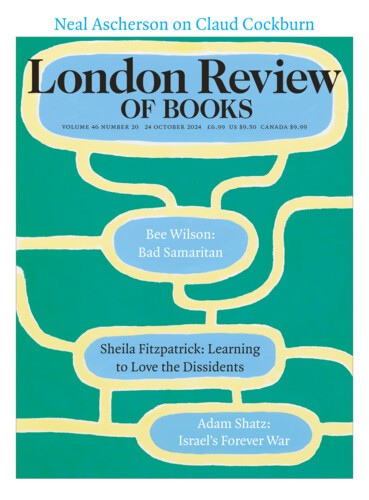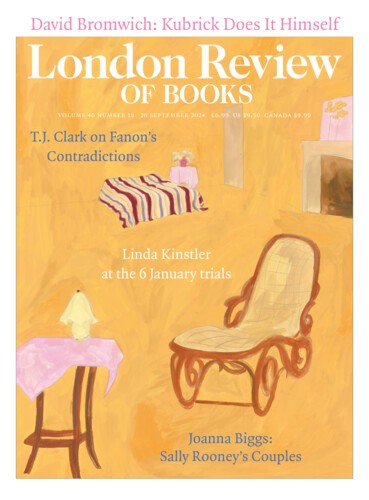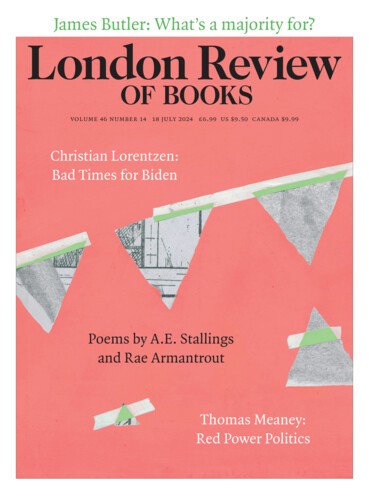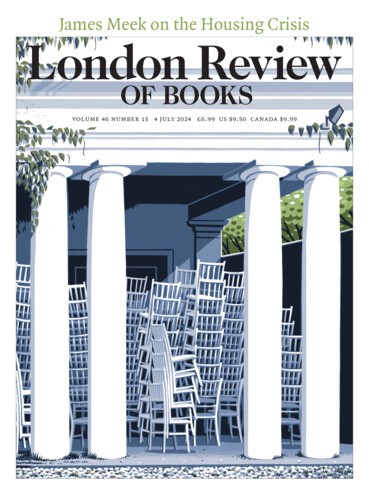It is almost the inverse of the Disney parks where you pay to have a prepared experience offered to you. At Ghibli you are left to make your own experience, playing out your memories of favourite films or scenes.
Rosemary Hill
Rosemary Hill’s most recent book is Time’s Witness: History in the Age of Romanticism. Her four-part series, The Lives of Stonehenge, can be found on the LRB Podcast. She is a contributing editor at the LRB.
Why Twice? Fire at the Mack
Rosemary Hill, 24 October 2024
On 23 May 2014, a fire broke out in the Mackintosh Building of the Glasgow School of Art, destroying its library. The loss to the Mack, as it’s generally known, Glasgow’s most famous building and possibly the greatest creation of its principal designer, Charles Rennie Mackintosh, elicited tributes and sympathy from around the world. Le Monde called it ‘a...
At the Musée des Arts Décoratifs: Death of the Department Store
Rosemary Hill, 26 September 2024
The department store is dying. It’s not the only building type to find itself marooned by social and economic change, but it is the youngest. Castles and churches, stately homes, factories and warehouses have all had to adapt or die, but none is so emblematic of a single historic period. Spanning the high-water mark of the industrial revolution, the department store was the offspring...
At the William Morris Gallery: On Mingei
Rosemary Hill, 18 July 2024
Artistic influence may benefit from a degree of misunderstanding: it keeps it from lapsing into imitation. By the time William Morris launched the Arts and Crafts movement in the 1860s, it took a certain wilful ignorance to believe, as he and Ruskin did, that the builders of the Gothic cathedrals were anonymous artisans, working humbly for the glory of God. Three generations of antiquarian...
The Talk of Carshalton: Pauline Boty’s Presence
Rosemary Hill, 4 July 2024
There has been more than one revival of interest in the mayfly career of Pauline Boty since her death in 1966 at the age of 28. In accordance with Cecil Beaton’s dictum that it takes slightly longer than 25 years for a cycle of taste to complete and for the merely dated to become historic, it was in 1993 that the Barbican put on The Sixties Art Scene in London, which featured several...
Podcasts & Videos
The Lives of Stonehenge: John Michell and Arthur Pendragon
Jeremy Harte and Rosemary Hill
Rosemary Hill and Jeremy Harte discuss the many groups and stories that have emerged throughout the 20th century to challenge the narratives about Stonehenge presented by archaeologists.
The Lives of Stonehenge: Wordsworth and Blake
Seamus Perry and Rosemary Hill
For the third episode in her short series on Stonehenge, Rosemary Hill is joined by Seamus Perry to experience the stone circle through the mind and eyes of a Romantic, with the likes of Wordsworth, Blake,...
The Lives of Stonehenge: John Aubrey and William Stukeley
Rosemary Hill and Kate Bennett
In the second episode of her short series looking at why Stonehenge has occupied such an important place in the story of Britain, Rosemary Hill talks to Kate Bennett about the two antiquarians, John Aubrey...
The Lives of Stonehenge: Inigo Jones and John Wood
Rosemary Hill and Vaughan Hart
Rosemary Hill begins a new four-part series looking at what people have thought about Stonehenge over the past few hundred years, and why it’s come to matter so much in the story of Britain. In the first...
Romantic History: Waterloo to the British Museum
Neil MacGregor and Rosemary Hill
In the final episode in our series looking at the way history was transformed in the Romantic period, Neil MacGregor joins Rosemary Hill to discuss the circulation of artefacts throughout Europe in the...
Romantic History: The Bayeux Tapestry
Rosemary Hill and Roey Sweet
In the third episode of her series looking at how history was transformed in the Romantic period, Rosemary Hill talks to Roey Sweet about the antiquarians, a new breed of multi-disciplinary investigators,...
Romantic History: Balmoral
Rosemary Hill and Colin Kidd
In the 1740s the Scots were invading England and the wearing of tartan was banned. By the 1850s, Queen Victoria had built her Gothic fantasy in Aberdeenshire and tartan was everywhere. What happened in...
Romantic History: Salisbury Cathedral
Rosemary Hill and Tom Stammers
In the first episode of a new four-part series looking at the way history was transformed in the Romantic period, Rosemary Hill is joined by Tom Stammers to consider how an argument over the ‘improvement’...
What does she think she looks like?
Rosemary Hill
Rosemary Hill looks at women and clothes, and what happens between them, in life and literature, in her 2018 LRB Winter Lecture.
Pieces about Rosemary Hill in the LRB
Leave me my illusions: Antiquarianism
Nicholas Penny, 29 July 2021
Moonlight on broken stone tracery is a common motif; dark interiors provide a foil for stained glass and for white satin and deep blue velvet. The men must be away on the crusades. Young women are sobbing...
Very Pointed: Pugin
Dinah Birch, 20 September 2007
Modern lives look prim beside the turbulent existence of Augustus Welby Northmore Pugin. Distractions and misfortunes proliferated throughout his career: shipwreck (he was in his own boat,...
Read anywhere with the London Review of Books app, available now from the App Store for Apple devices, Google Play for Android devices and Amazon for your Kindle Fire.
Sign up to our newsletter
For highlights from the latest issue, our archive and the blog, as well as news, events and exclusive promotions.





